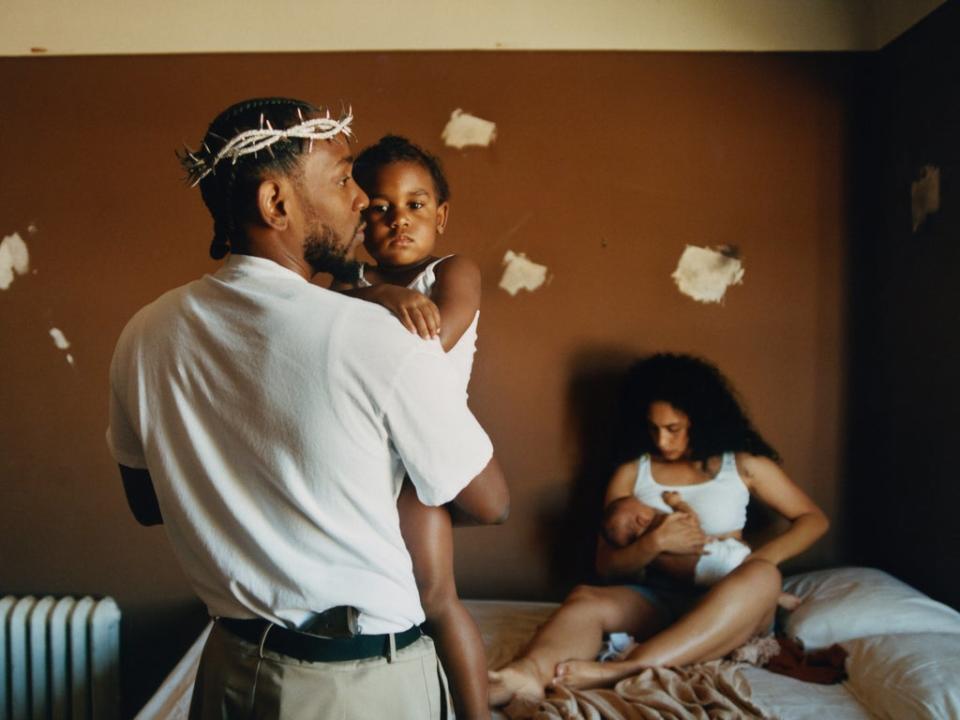Kendrick Lamar review, Mr Morale and the Big Steppers: A tender opus from the defining poet of his generation

Hip-hop’s oracle returns in a crown of thorns for his latest prophecy: a surprising meditation on fatherhood, family and friendship. Kendrick Lamar’s work has always been introspective, but Mr Morale and the Big Steppers – with guest spots from artists including Florence Welch, Beth Gibbons, Summer Walker and Sampha – has a delicacy and tenderness to it that is unprecedented for the father of two from Compton, California.
Because of this, Mr Morale and The Big Steppers is most redolent of Lamar’s second album good kid, m.A.A.d city, which remains one of his most personal records. Lamar’s calling card is conscious hip-hop: introspective, politically astute, with smart wordplay and often jazz-inflected musicianship. He is an artist of contrasts, peppering reflective poetry with brutal putdowns. Mr Morale calls to mind 2013’s “Cartoons and Cereal” – a leaked cut that never made it onto any of Lamar’s albums because of sample clearance issues, yet remains one of his most touching (and loved) songs. In it, Lamar’s dissociated delivery observes a kid watching cartoons while chaos unfolds around him.
Those same themes are refracted through the eyes of a parent in “Worldwide Steppers”, an exploration of fatherhood that is one of Mr Morale’s most interesting and haunting songs. It has a juddering rhythm that hits like a bruised peach, thanks to its soft, thudding sample from The Funkees’ ‘Break Through’. Here, Lamar is “playing Baby Shark with my daughter, watching for sharks outside at the same time. Life as a protective father: I’d kill for her.” He loves to play with contrasts, and so “Die Hard” has a gentle flute line and a blissful melody. “I hope I’m not too late to set my demons straight,” sings LA rapper/producer Blxst in a gentle cameo that tees up “Father Time”. When Lamar does cut loose in Mr Morale, he rarely targets other rappers. It’s true that he namechecks Kanye and Drake here, but it’s only to say that he was “slightly confused” by their reconciliation, concluding that all of them are “grown men with daddy issues”.
In fact, the most ruthless track is “We Cry Together”, which takes the form of an argument between a couple – not exactly a battle rap, but definitely not a duet. Florence Welch sings the blink-and-you’ll-miss-it intro in the unlikeliest guest spot on the album... until Zola star Taylour Paige starts rapping moments later: “You the reason Harvey Weinstein had to see his conclusion. You the reason R Kelly can’t recognise that he’s abusive.” Lamar retorts: “Women in general can’t just get along/ Why R&B bitches don’t feature on each other songs?”
“Purple Hearts” has a Ghostface Killah guest verse and a typically lush, languid appearance from R&B singer Summer Walker. “Shut the f*** up when you hear love talking,” sings Lamar. It’s a prelude to follow-up “Count Me Out”, which rejects fame: “Done every magazine, what’s fame to me?/ It’s a game to me, where the bedroom at?/ Sleep, I ain’t had to flex with that.” The return to what’s real – family, love, friendship – is the thread that ties the album together. In “Silent Hill”, Lamar is “Pushing the snakes, I’m pushing the fakes, I’m pushing them all off me.” And in “N95” – which is about masks but not the Covid kind – Lamar raps: “Take all that designer bulls*** off and what do you have? Bitch you ugly as f***.”
“Crown”, the album’s shimmering, sparse centrepiece, sees Lamar rapping “I can’t please everybody” over south-London pianist Duval Timothy’s “Through the Night” – a moody track reminiscent of Chilly Gonzales. It’s similar to “Mother | Sober”: another piano-driven song with a shivery line from Portishead’s Beth Gibbons’s inimitable voice: ghostly, childlike and clear as glass. Mr Morale & The Big Steppers is a sheaf of songs delving into conflict and reconciliation. It is anchored in Lamar’s own life, right down to a cover that features the first confirmation of the birth of his second child, Enoch. He has earned this moment of reflection.

